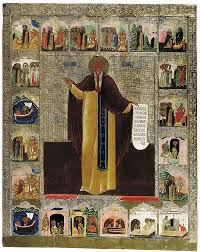As we stand on the eve of Holy Week, it is fitting that the Church recall on this memorial, Pope Saint Martin I (+649), one of the noblest, if most tragic, of the successors of Saint Peter. Born in Umbria, Italy, he was of noble lineage, with great intelligence combined with charity and love of the poor. What struck me was one mission upon which he was sent by Pope John IV in 641 to redeem prisoners from the Slavs; Martin also piously gathered up many scattered relics, which he placed in a chapel he had built in Rome, signifying something deeply spiritual in him, in the midst of his temporal duties.
He was appointed apocrisiarius, or legate, to Constantinople and soon, with virtues so apparent, elected to succeed Pope John in 649, an office that would soon lead to his early death.
With the decline of Rome two centuries earlier – after the purported ‘fall’ with the deposition of the last pathetic emperor, the child Romulus Augustulus – power was now centralized in Constantinople, and, at this time, its emperor Constans II. Sadly, the East was also infected with the heresy of monothelitism, that Christ had no human will, but only a divine one, safeguarding, so they thought, the integrity of His Godhead, and the chance that His human will could somehow rebel and thwart the implacable divine decree.
This insidious heresy would have negated the reality of the Incarnation, as with no human will, Christ would not have assumed a full human nature, and therefore would not really have ‘become Man’, one like us in all things, but sin.
Pope Martin realized this, and summoned a Council as soon as he was elected, in 649, which convened at this own cathedral, Saint John Lateran, condemning the heresy in no uncertain terms, proclaiming the reality of two wills in Christ, divine and human, corresponding to the two natures which coalesced in the hypostatic union of His one divine Personhood.
Emperor Constans realized the threat this posed to his own authority, spiritual and temporal, so ordered the Pope’s arrest by the Exarch of Ravenna, the Roman city where Eastern authority was located in the West. The first exarch refused to carry out the order, but his successor had no such scruples, arresting Pope Martin at the Lateran on June 17, 653 – contrary to the laws of sanctuary, it seems – and hauling him, along with Saint Maximus the Confessor, the great intellectual foe of monothelitism, and one of the most profound of spiritual authors – in chains to Constantinople.
Maximus – whose story deserves its own article – was tortured, his right hand cut off and his tongue ripped out, so he could no longer ‘confess’ his ‘heresy’ – and died in exile in 662.
Constans likely thought that mutilating and executing the Pope would be unwise, making a martyr of him, so Martin was left to linger, exposed on the dock upon disembarking to taunts and jeers, stripped and paraded through the city, and left in prison, cold, hungry, cramped. But the great man, whose integrity shines through the ages, would not submit to the caesaropapist emperor, refusing to sign the Typus, which would have authorized the monothelitist heresy.
After months of isolation and starvation, through which he must have been sustained by the graces bestowed through deep prayer, the Pope was eventually exiled to Crimea, where he died a few months later, around the time of his companion Maximus, in September of 662, and a martyr he did indeed become, one of the most notable of witnesses to the Faith, of which he had been chosen as a defender and guardian.
The truth for which Martin and Maximus gave their lives was recognized two decades later, at the Third Council of Constantinople, which condemned monothelitism for all time, reaffirming the truth Pope Martin had declared in 649, that Christ, along with two natures, also had two wills, united in His one divine Person. It was thus God willed His Christ fulfill our redemption, taking our full humanity – including all of our sins and weaknesses – upon Himself, all the way to the Cross, where he atoned for all moral evil, opening the gates of heaven to everyone who assents to His truth. As Christ prayed in the Garden, let not my will, but Thine be done…
A fitting day to pray for our Holy Father, and all of our bishops and priests, that they too not only remain faithful to the Truth, but proclaim that Truth clearly and without compromise, with courage and conviction, in the face of a world growing more inimical, even diabolical, by the day.
But Christ is for us, so who can be against?
Saint Martin and Saint Maximus, orate pro nobis!

